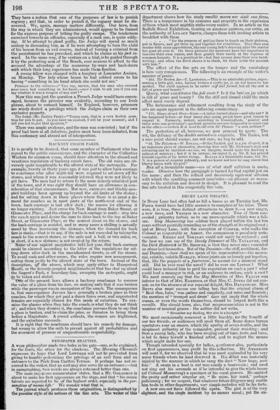NEWSPAPER BEAUTIES.
A WISE philosopher made two holes in his gateŌĆöone, as he explained, for the fowls, the other for the chickens. The Morning Chronicle expresses its hope that Lord LOWTHER will not be prevented from giving to humble pedestrians the privilege of an extt from and an entrance to the Park from Carlton Terrace. It perhaps has not oc- curred to the writer, that an exit may also serve for an entrance ;ŌĆöbut in paragraphing, two words are always esteemed better than one. The same ingenious commentator states, that a Mr. GOLDSMID is about to make his first appearance on the stage, and that "his comic talents are reported to be of the highest order, especially in the per- sonation of mimic life." We wonder what that is. The journal which produces these originalities, is distinguished by the peculiar style of its notices of the fine arts. The writer of this department shows how his study emollit mores nec sinit esse feros. There is a temperance in his censures and propriety in the expression of them which must mightily strike every reader. In an article on the Suffolk Street Exhibition, treating on amateur painters, our critic, on the authority of LEGACY SMITH, charges them with inviting artists to breakfast with them
"for the purpose of getting them to touch on their pictures, put in figures, and get them up and together for exhibition. They then pass muster with some approbation, like any young lady's drawing atter the master has gone all over it. On these pictures the amateurs have the impudence to inscribe their own names, and thus gratify their vanity at the expense of common honesty. It is a practical lieŌĆöbut they cannot deny their own hand. writing ; and when the Devil shows it to them, let them settle the account with him."
The effect of the fine arts on the temper and the vocabulary is here very conspicuous. The following is an example of the writer's manner of praise. "404. The Broken ..TarŌĆöC. LANDSEER.ŌĆöThis is an admirable picture, repre- senting a little girl, who, havino.c' broken a costly jar, is on her knees to her mother. The child appears to be rather stiff. and foimal, but all the rest is full of grace and beauty." Query, what constitutes the joli reste Is it the broken jar which is full of grace and beauty ? On the stiff and. formal child the main effect must surely depend. The forbearance and refinement resulting from the study of the arts are again apparent in the following commentary.
"175. Stage-struck HeroŌĆöKrop.---A tailor turned playerŌĆöand why not ? It has happened beforeŌĆöat least many play-going people have good reason to suspect it. Formerly, indeed, according to Cunningham, painter and tailor were one profession'ŌĆöportrait painters are now frequently as much one as the otherŌĆöa certain R.A. used to call even Sir Thomas "a man milliner."
The perfection of all, however, we now proceed to quote. The wit, the delicacy of the double entendre is exquisite. The Italics, lest a nice point should escape, are not ours, we beg to add.
"19. The TalismanŌĆöW. BOXALL.ŌĆöIf this Turkish girl is a jeu d'esprit, it is an ingenious piece of pleasantry, showing how well Mr. NEWTON'S style and colouring can be imitatedŌĆöno one, we imagine, would make his drawing a subject of mimicry ; but if it be serious, we regret it, as ivlr. B. has proved himself capable of 'far better things. Boxim. is a formidable name, but Mr. N. is a person of singular gallantry, and we know nut how he may resent this liberty taken with his girt." Box all a.formidable nameŌĆösee of what stuff criticism is made, reader. Observe how the paragraph is turned for that capital jest on the name ; and then the refined and decorously equivocal allusion with Which the sparkling comment concludesŌĆöan allusion so neces- sary to the criticism and decent in design. It is pleasant to read the fine arts treated in this congenially fine vein.


















 Previous page
Previous page